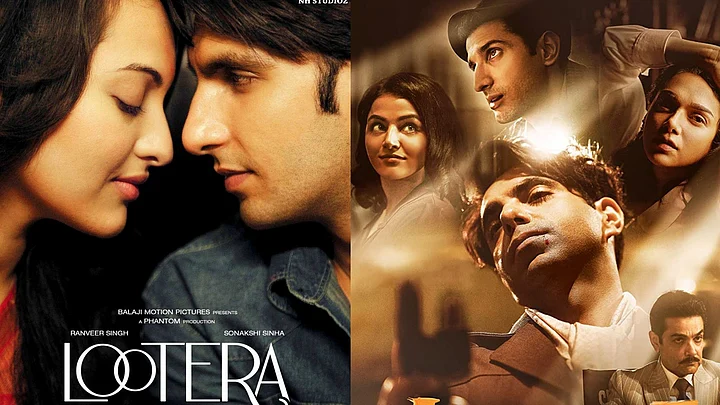Vikramaditya Motwane’s Jubilee is a homage to filmmaking – the art of it, the business of it and ultimately the politics of it. All characters are driven to prove their love for cinema – what they are willing to sacrifice to find footing in a world that is painstakingly difficult to start in.
Motwane narratives often revolve around the promise of a better tomorrow, but at what cost? From Lootera to Bhavesh Joshi – he builds worlds of strife and ambition. Not at all bogged down by the weight of morality, there is something singular about his narratives. His heroes are withdrawn and quiet, the setting is pulsating with its characterization, and the women are arguably on the outside looking in.
Shades of Grey In Motwane's Heroes
In Jubilee, the story commences with Binod Das (Aparshakti Khurana), the right-hand man of Srikant Roy - the owner of Roy Talkies. On the surface, the studio is on a hunt to look for its next rising star. And it seems they have found him – Jamshed Khan from Karachi is the answer to their prayers. But ultimately, it’s Binod in the guise of Madan Kumar who becomes the star.
His characterization is reminiscent of Ranveer Singh’s Varun in Lootera, a man who steals valuables from his lover’s home and escapes on his wedding night, leaving his partner completely distraught. This is not to say, he didn’t love her, he did, but like many other characters in Motwane’s narratives, he is intrinsically flawed.
Binod is also the quiet man, majorly withdrawn, shaped by the rebuke that is incessantly hurled upon him because of his loyalty to his employer. There is a simmering anger in him, that sees the light of day from time to time. He is a dangerous man, but he is not only that, much like Varun.
Even in Bhavesh Joshi's Siku isn't shaped to be the commercial hero despite being a superhero. He is quiet and withdrawn and circumstances compel him to take uncharacteristic decisions.
All three of them, quietly, if not successfully do what they must. They fail, falter and their actions are questionable. But their will throughout all three narratives, is commendable.
Setting as a Character
Jubilee sees the Partition of India as Motwane’s immediate backdrop, he arguably cultivated the story with its political pressures and communal violence in mind. They are intrinsic to the narrative and it propels the plot. Unlike Lootera, wherein the backdrop is merely the setting – although a character too. Love blooms in the picturesque town of Manikpur, West Bengal – love dissipates and struggles in the snowclad hill station of Dalhousie. Both these settings have a beating heart – what the characters feel seems to be transfused into the backdrop.
Bhavesh Joshi, set in urbane Mumbai, is also steeped in hues of blues and blacks, anticipating the characters' motivations for a better tomorrow, which is almost always out of reach. With systematic corruption being the predominant enemy – the urban, detached Mumbai speaks volumes about the tragedy of the modern man.
And of course, the setting of Trapped is invaluable to the story – not only does it monitor the survival-thriller but also echo the isolation of city life, where there are more heads than what we care to remember.
Jubilee is different from the rest of these stories but perhaps it also intersects in ways that remind us that our context is infallible – Jay from the show cannot escape his religion or his love for cinema. Shaurya from Trapped and Siku from Bhavesh Joshi manages it, but to what end, it’s hard to say.
Women – Outside Looking In
Except for Sonakshi Sinha’s Pakhi in Lootera, Vikram Motwane’s female characters are generally always on the outside, looking in. Pakhi was the only character who could exercise her autonomy, perhaps because she was a zamindar’s daughter. Jubilee’s Sumitra (Aditi Rao Hydari) is a close second, and Niloufer a close third.
Sumitra is callous, dismissive and stubborn but she exercises her power to the best of her abilities yet cannot get what she wants. Part owner of Roy Talkies she manages to hold her own in a predominantly man's world. She has social capital but even then her authority is often undercut. Niloufer, on the other hand, is brimming with life and anticipation, and not much can quell her thirst for more, but she is gambling her future on the shoulders of men she cannot fully trust.
The women in Trapped and Bhavesh Joshi are also skirting the main narrative, never quite as important but relevant nonetheless.
But most of these stories aren’t about women. In Jubilee, the characters strive to orchestrate their moves the best they can – but it’s ultimately a man’s world. And as it isn’t predominantly a love story and more so a love affair between characters and their love for cinema – everything becomes secondary to the films they are trying to make – the men included. The same, however, cannot be said about Lootera. Pakhi, perhaps, is the only leading lady who gets a happy ending in the non-traditional sense from a non-traditional man.
In the end, though, the characters in Motwane's stories tussle with their emotions of greed and ambition, toeing the line of right and wrong – till it collates and combusts. Varun in Lootera to Jay in Jubilee - Motwane ensures we know that love, success and everything in between in all ephemeral – nothing is set in stone – even if their is a the Faustian bargain in place.
(At The Quint, we question everything. Play an active role in shaping our journalism by becoming a member today.)
